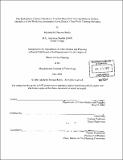The shift from a contract-based to a voucher-based job training delivery system : the effect of the Workforce Investment Act on Boston's non-profit training providers
Author(s)
Persson Reilly, Michelle M. (Michelle Marie), 1973-
DownloadFull printable version (7.773Mb)
Alternative title
Effect of the Workforce Investment Act on Boston's non-profit training providers
Other Contributors
Massachusetts Institute of Technology. Dept. of Urban Studies and Planning.
Advisor
Chris Tilly.
Terms of use
Metadata
Show full item recordAbstract
The Workforce Investment Act of 1998 (WIA) took effect on July 1, 2000, replacing the Job Training Partnership Act (JTPA) and becoming the most recent in a series of public interventions in the area of employment and training in the United States. WIA made many significant changes to the way publicly-financed job training services are funded, targeted, and accessed. It prioritized job placement over training and shifted from targeting low-income populations to universal access to services. Most significantly, WIA replaced contracts to training vendors with a customer-held voucher system administered through "One-Stop Career Centers," which act as the center of all local employment and training activity. These changes caused significant concern for non-profit job training providers who worried about the effect of this new legislation on their organizations, their job training programs, and their clients. From the perspective of non-profit job training providers in Boston, this thesis attempts to explain the initial concerns related to WIA and to analyze whether these predictions are playing out in practice now that the first year of implementation is well underway. This analysis is based on a survey of non-profit job training providers in Greater Boston conducted in August 2000 and in-depth follow-up interviews in March and April 2001 with five of the survey respondents who previously received JTPA funding and now receive WIA funding. Additionally, this research is based on reports, articles, and books written on U.S. employment and training legislation, the Workforce Investment Act, and vouchers in a variety of social service arenas. This thesis demonstrates that non-profit job training providers initially worried about program financing, cash flow, program planning, coordination with career centers, competition, marketing, and exclusion of the most disadvantaged clients. The interviews illustrate that most of these initial concerns have continued to challenge non-profit providers well into the first year of WIA implementation. Certain characteristics, however, have assisted some providers in overcoming these challenges more easily than others. Career center partners, large organizations with a commitment to workforce development, providers with a wide diversity of funding sources, and programs serving a particular niche of the labor force, all appear to have advantages in the new training system.
Description
Thesis (M.C.P.)--Massachusetts Institute of Technology, Dept. of Urban Studies and Planning, 2001. Includes bibliographical references (leaves 87-89).
Date issued
2001Department
Massachusetts Institute of Technology. Department of Urban Studies and PlanningPublisher
Massachusetts Institute of Technology
Keywords
Urban Studies and Planning.